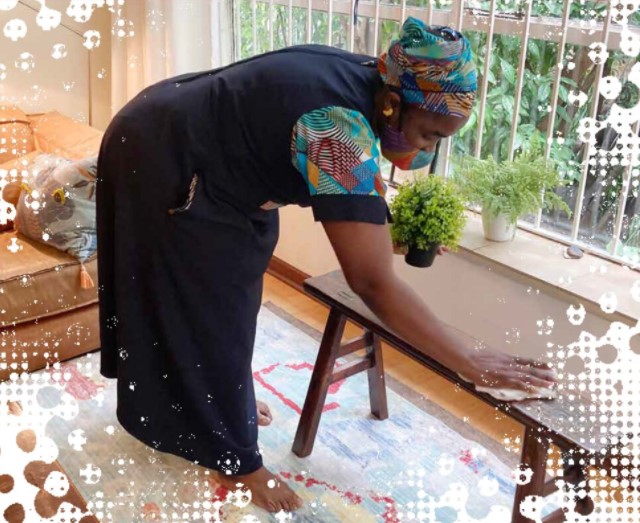
Feb 3, 2022
“The dignity of people’s very being is at stake,” said IZWI Domestic Worker Alliance’s founder and lead researcher Amy Tekie in opening remarks at a recent webinar focused on a new qualitative survey of human rights violations against live-in domestic workers in South Africa.

“Really awful things are happening behind closed doors,” said IZWI’s Amy Tekie.
“The Persistence of Private Power: Sacrificing Rights for Wages“—co-published by Johannesburg-based IZWI Domestic Workers Alliance and the Solidarity Center—surveys the constitutional and human rights of live-in domestic workers in South Africa. It describes how domestic workers’ rights to privacy, freedom of movement and children’s right to parental care are frequently sacrificed for wages in a sector underpinned by racism, sexism and classism. Resulting exploitation—largely invisible because of the private spaces in which it occurs—continues regardless of constitutional protections and industry-specific labor regulations.

We are expected to be indoors even when it is our off day,” said the survey’s lead field researcher Theresa Nyoni. Credit: IZWI
“We are not allowed to be seen around,” said the survey’s lead field interviewer, Theresa Nyoni, of a sectional title housing complex in which she was formerly employed as a domestic worker.
Nyoni described almost universally denied opportunities for live-in domestic workers in sectional title housing to enjoy open spaces on, or near, the employers’ property and lack of freedom to move around or receive visitors in their own quarters—even during off hours. And, for most live-in domestic workers, she noted invasive employer surveillance and almost total lack of privacy.
“We are sleeping with kids and not allowed to lock the door; parents barge into the room and even the bathroom,” she said.
Employers isolate domestic workers by routinely denying them visits from friends, spouses and children, and some domestic workers say they are not allowed to leave their employer’s home for any reason. Nyoni described her former employer’s refusal to allow her to leave the work premises, on her own time, to purchase and arrange for transportation of bulk food items to her own children during the pandemic.
“When I held a plate of food to eat, I was thinking: Did my children get food today?”
Survey interviewees outlined living conditions that Tekie described as “almost kidnapping [in its] constant and complete employer surveillance and control.” Besides being isolated from loved ones, many live-in domestic workers said they were denied employer permission to keep their infants with them, receive packages or use their employer’s kitchen to preserve and prepare their own food, and those employed in sectional title housing complexes reported repeated employer and security guard searches. Some live-in domestic workers said they have chosen abortions for fear of losing their jobs.
IZWI interviewed 115 mostly migrant live-in domestic workers for the survey, most of whom were working in or near Johannesburg—where working conditions are anecdotally better than those than in rural areas, said Tekie. Approximately half of South Africa’s more than 800,00 domestic workers live in by IZWI’s estimate, although definitive data does not yet exist, she said.

The survey affirms that state silence perpetuates the status quo, said McGill University Faculty of Law Professor Adelle Blackett.
McGill University Faculty of Law Professor of Transnational Labor and Development Adelle Blackett underscored the significance of the report being centered on the lived experience of domestic workers and the persistence of private power in their lives, even post-Apartheid.
Describing the report as “chilling,” Blackett defined the status quo for South Africa’s domestic workers as, “historicized, racialized, intersectionalized enslavement to domestic servitude.”

“[This report] is only the tip of the iceberg,” said former South African Labor Court judge Urmilla Bhoola.
“When domestic workers live in, they forfeit their rights,” she said. And so, civil society legal activism is essential, including that spearheaded by trade unions, she added.
Report recommendations include extension to domestic workers of many of the rights contained in South Africa’s farmworker Extension of Tenure Security Act (ESTA) but absent from Sectoral Determination 7 governing domestic work. ESTA guarantees to farmworkers residing on employers’ land “the right to human dignity”—including privacy, having family life, the freedoms of association, movement and religion, and to have visitors and receive postal communication.” Alternatively, concludes the report, legislation specific to the domestic work sector should be created that includes:
- Minimum housing standards for all live-in domestic workers, not only those paying rent
- Basic regulations on rights to family life and visitors, including the right for family to cohabit with a worker, within residential density laws, and the right for workers to have visitors in their homes
- Regulations to protect privacy, explicitly preventing employers from searching rooms, phones or property without permission
- Clear protection of a worker’s right to move freely during off hours
- Guidelines on bullying, harassment and assault, as those provided in the labor law do not address the specifics of the domestic sector
- Guidelines for provision of food.
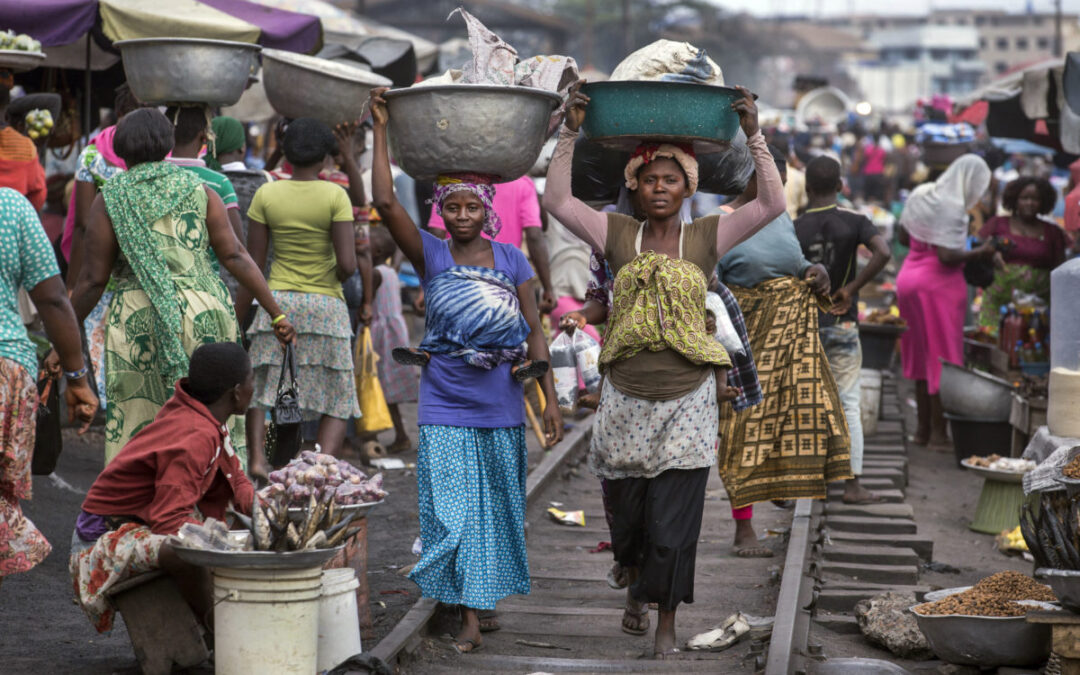
Dec 9, 2021
Informal workers are routinely excluded from economic and political decision-making, and their work is systematically devalued and made invisible. The COVID-19 pandemic has only intensified these dynamics and has resulted in skyrocketing rates of domestic violence, bringing a renewed urgency to address poverty, exclusion and precarious work.
Labor leaders, organizers and advocates from around the world gathered on December 2 for a virtual panel discussion of the impact of gender-based violence and harassment (GVBH) on workers in the informal economy. The discussion was sponsored by the Global 16 Days Campaign (coordinated by Center for Women’s Global Leadership), Global Alliance of Wastepickers, HomeNet International, International Domestic Workers Federation (IDWF), International Trade Union Confederation (ITUC), International Transport Workers’ Federation (ITF), Solidarity Center, StreetNet International and Women in Informal Employment: Globalizing and Organizing (WIEGO).
Robin Runge, Solidarity Center Equality and Inclusion Department co-director, moderated the panel, which included: Chidi King, branch chief, Gender, Equality, Diversity and Inclusion, International Labor Organization (ILO); Carmen Britez, vice president, International Domestic Workers Federation (IDWF); Janhavi Dave, international coordinator, HomeNet International; Sonia George, general secretary, Self Employed Women’s Association (SEWA) and a SEWA homeworker; and Saraswati Rijal, central committee member, Independent Transport Workers Association of Nepal (ITWAN).

Chidi King, branch chief, Gender, Equality, Diversity and Inclusion, International Labor Organization (ILO)
Chidi King framed the discussion, citing the themes and issues to be addressed. “As we all know, violence and harassment in the world of work is a manifestation of the societal issue that has deep roots in the continued tolerance of violence and harassment,” King said, “particularly towards women and population groups that too often find themselves on the margins of society.”
Women workers, who make up the majority of informal economy workers in many countries, are disproportionately affected. “Violence and harassment have deep roots in social norms and stereotypes,” King said, “especially around the roles assigned to men and women.
“And as a connection to inequality and discrimination suggests,” King added, “violence and harassment is also deeply rooted in unequal power relations, and the abuse thereof, in our societies, as in the world of work.” Thus workers play an important role in addressing and remedying violence and harassment, including addressing the impacts of domestic violence in the world of work.
ILO Convention 190 (C190) protects all workers and recognizes that for many the workplace is not an office or factory setting, but can be a public space or private. C190 protects informal economy workers, who work in their own homes or the homes of others, and recognizes the impact of domestic violence in their workplaces.
However, many countries’ laws do not recognize homes as workplaces, leaving many workers in the informal economy lacking protection against violence and harassment and without access to social safety nets. During the COVID-19 pandemic, informal workers have experienced high rates of domestic violence and difficulty accessing social support services that have been put on hold.
Saraswati Rijal spoke about working with women tuk-tuk drivers in Nepal to build support for women workers during the pandemic and supporting victims of domestic violence. COVID-19 has only made conditions worse, as women workers are forced to choose between their and their families’ health or earning an income and risking being subjected to unnecessary hazards.
Workers in the informal sector “do not have any economic security,” Rijal said. “And moreover, due to COVID-19, they are deprived of their daily wages, and they are also unable to earn their living and sustain their livelihood.”
Carmen Britez spoke of IDWF’s work with the Ministry of Labor in Argentina to develop exclusive protection for domestic workers around domestic violence. Domestic workers suffer not just from not having registered employment, but from also having no protection against violence. Britez said that lockdowns during the COVID-19 pandemic have forced many domestic workers to be shut in with their abusers.
Argentina ratified C190 in November 2020. Britez emphasized C190’s role as a tool to push for national legislation: “We were pushing for this convention so that it could become another tool in changing national law. If we have laws that protect us around violence, we want something that would not only include specific sectors but all sectors at a national level. Because that’s really important for us as women workers.”
“It’s also important to say this is not just an issue facing women. “We do account for the majority of those who are suffering from this kind of violence,” Britez added. “But it also is important for us to let our [union] leadership, who are often men, to let them know that it’s also their responsibility to push for a national law on this topic.”
To underscore the urgency of the issue, Britez shared that during her remarks her center received news of a woman whose employer broke her wrist.
Janhavi Dave spoke of the scale of the problem of domestic violence and its impact on women workers. “According to one of the recent ILO studies, there are over 260 million home-based workers, which is around 8 percent of global employment. This was prior to the pandemic, and this number has only increased,” Dave said. “According to the same study, 56 percent of home-based workers are women. So we’re actually talking about a huge section of women workers.”
HomeNet South Asia, a regional organization, conducted a study on the impact of domestic violence on home-based workers in Nepal, and is conducting similar studies in Bangladesh, India and Pakistan. “One of the key findings was that home-based workers faced rampant domestic violence,” Dave said, “which has a direct impact not only on physical and emotional health but also on productivity.”
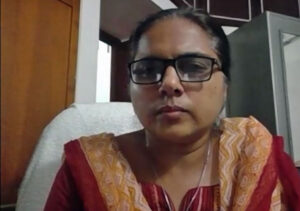
Sonia George, general secretary, Self Employed Women’s Association (SEWA)
SEWA’s Sonia George introduced a traditional bamboo worker, who shared her experience as the sole earner for her family, which included her husband and their two children. Her husband, she said, was supportive in the beginning of the marriage, but became physically violent after he was out of work. Sibimol was forced to leave her traditional job and go to work in a latex factory in order to earn a livelihood and escape domestic violence at home.
“This is the experience of most of the women in India,” George said after Sibimol shared her story. “We know that most of these women have experienced domestic violence. One of the statistics states that during the time of COVID, domestic violence has increased 2.5 times. That means women in India are suffering that much more violence.”
Lorraine Sibanda shared how COVID-19 also worsened conditions for women workers in Zimbabwe. “The pandemic exposed adverse challenges for women,” Sibanda said, “because they are performing unpaid care work, domestic care work, on top of providing for their families.” Measures to control the spread of COVID-19 compromised livelihoods and increased economic strain on families supported by the informal economy.
Lockdowns and restrictions also increased rates of domestic violence. “It meant that women and girls were locked down in their homes,” Sibanda said. “They were forced to spend time enclosed with families, and possibly many were trapped at home with their abusers.”
Married and partnered women also faced physical violence from husbands and male partners for refusing to hand over their earnings. “They would be abused physically because they refused to hand over money, which they’ve been working for, to their partners, so that their partners could either go for a drink or use that money,” Sibanda said. She also suggested that Zimbabwe had seen an increase in child marriage. ”There was this rampant trait of people marrying off children in order to gain economically.
“All in all, the pandemic amplified the vulnerability of women and girls,” Sibanda concluded.
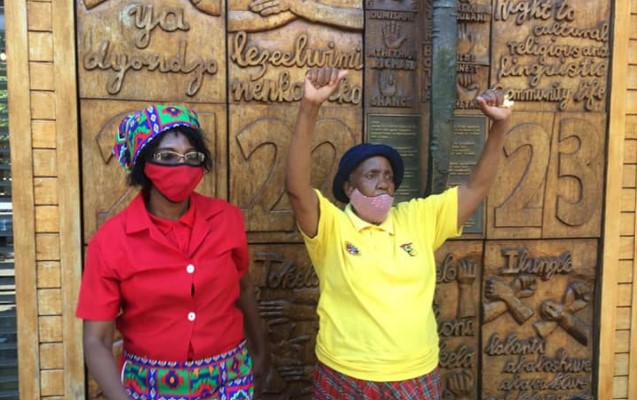
Jun 15, 2021
On June 16 International Domestic Workers Day, domestic workers are celebrating a landmark legal win by South Africa’s domestic workers for colleagues who die or are injured in their employers’ homes. For the first time, starting this year, domestic workers who suffer injury on the job are eligible for compensation for temporary and permanent disability, medical expenses, funeral costs and survivor benefits.
Until last year, South Africa’s approximately 1 million privately employed domestic workers suffered deaths and crippling injuries without access to compensation for themselves or their dependents because domestic workers were excluded from South Africa’s Compensation for Occupational Injury and Illness Act (COIDA). With Solidarity Center support, the South African Domestic Service and Allied Workers Union (SADSAWU) and human rights organization Socio-Economic Rights Institute of South Africa (SERI) litigated and won a long-denied claim for the dependent daughter of Maria Mahlangu, a privately employed and partially sighted domestic worker who had fallen into her employer’s swimming pool and drowned in 2012. The historic judgment, made by the South African Constitutional Court in mid-November, recognized that injury and illness arising from work as a domestic worker in a private home is no different to that occurring in other workplaces and thus equally deserving of COIDA coverage.
Myrtle Witbooi, general secretary of SADSAWU and the first president of the International Domestic Workers Federation (IDWF), said in addition to the last year’s court ruling, South Africa’s domestic workers can also celebrate this year’s hard-fought win under revised compensation rules of three years of retroactivity to submit claims.
Under the new rules, all employers of domestic workers must register with the Compensation Fund or face penalties, and make annual payments to cover their employees. SADSAWU is focusing its efforts on educating employers and domestic workers about their obligations and rights under the new rules, says Witbooi. SERI made a new domestic worker compensation information fact sheet available to domestic workers, paralegals and community advice offices this month, while SADSAWU is producing and distributing an educational WhatsApp video and pamphlet and translating the amendment into local languages.
The unions and SERI continue to press the government for more time for domestic workers to submit claims and increase retroactivity. “We must remain that beacon of hope for workers,” says Witbooi.
Meanwhile, another domestic worker, Nobuhle Ndlovu, drowned in her employer’s swimming pool last month.
Ten years after the adoption of an International Labor Organization (ILO) Convention confirmed their labor rights, domestic workers across the globe are still fighting for recognition as workers and essential service providers, as documented by a new ILO report. And, although 32 countries have ratified Domestic Workers Convention 189, and 29 have entered the convention into force, most of the world’s 75.6 million domestic workers are still being denied social protection rights, including access to national health insurance, pension schemes and compensation funds.
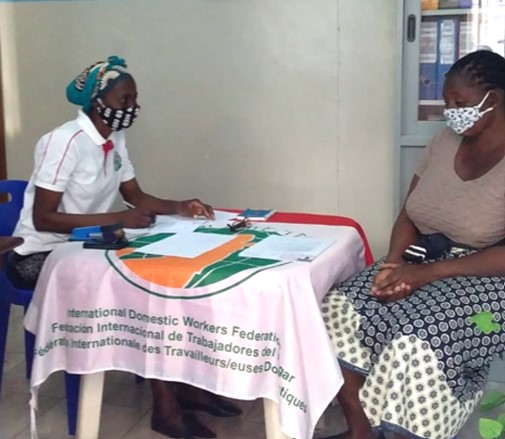
May 11, 2021
The International Domestic Workers Federation (IDWF) is urging more than 25 Africa-based affiliates to use the results of a new survey documenting the suffering of Africa’s domestic workers and their dependents during the pandemic to lobby their governments for urgent reform. Conducted by domestic workers with 3,419 of their peers in 14 African countries from November 2020 through January 2021, the survey found that only 17 percent of respondents received emergency income, food or other state-provided social support—and that most of that number received such support through another household member because they were not themselves eligible.
“It’s one thing to lose your job, it’s another thing to lose your job in a context where you don’t have access to unemployment benefits, social security or any income support,” says IDWF Lead Research Associate Louisa Acciari and post-doctoral researcher at the Federal University of Rio de Janeiro. “I think this is something where the unions can really campaign at the national level to get more inclusive social protection policies.”
Only 6 percent of those unable to work received employer-provided wages, while almost one-third of survey respondents were laid off—85 percent of whom were the main family breadwinner. They received no severance pay and remained out of work for up to six months. Nearly half of survey respondents suffered income reduction that had a dramatic impact on their household and was exacerbated by rising food and transportation costs.
During a recent event, IDWF leaders urged affiliates to use survey data in national campaigns lobbying their governments for inclusion of domestic workers in unemployment, health insurance, injury and illness compensation, and pension schemes, and for ratification of ILO Conventions ILO Conventions 189 on Domestic Workers and 190 on Violence and Harassment.
“Now we have an additional tool to fight until we get our rights, our social protections. People will remember what we say if they hear us saying [it] with numbers,” said IDWF General Secretary Elizabeth Tang.
More than 25 IDWF affiliates conducted peer-to-peer surveys in English, French, Portuguese and multiple local languages in Burkina Faso, Ethiopia, Guinea, Ivory Coast, Kenya, Malawi, Mozambique Namibia, Senegal, South Africa, Tanzania Togo, Uganda and Zambia.
“Through it all, the IDWF has shown the world that we are united,” said IDWF President and General Secretary of the South African Domestic Service and Allied Workers Union (SADSAWU). “There is much more to be done.”
Based on survey findings, IDWF recommendations include that governments:
- Conduct awareness-raising campaigns regarding occupational health and safety standards, worker rights and employer responsibilities
- Distribute personal protective equipment at key access points such as bus and taxi stands
- Introduce price controls
- Expand income-support measures to domestic workers
- Extend contributory social insurance to domestic workers
- Where absent, introduce contributory unemployment benefits for domestic workers
- Ratify ILO Conventions 189 and 190 and adopt complementary national legislation for implementing an appropriate enforcement framework
- Adopt legislative reforms to ensure effective expansion of social protection to domestic workers.
“The Impact of COVID-19 on Domestic Workers of Africa” survey is part of a global IDWF research project that includes Latin America and the Middle East and North Africa. Around the world, the pandemic has vastly widened gender, racial and economic divisions. CEOs have raked in record profits during the pandemic, and 8 of the 10 wealthiest people in the world have grown billions of dollars richer over the past year. On the other side, domestic workers, agricultural workers, trash collectors, street vendors and a growing number of gig workers employed through app-based services were recognized as essential over the last year and hailed as heroes, yet are among the most economically undervalued and underserved. The COVID-19 crisis cost women around the world at least $800 billion in lost income in 2020, equivalent to more than the combined GDP of 98 countries, said Oxfam last month.
The Solidarity Center partners with the IDWF around the world, supporting domestic workers’ efforts to access their rights. As of April 2021, the IDWF has 81 affiliates from 63 countries.
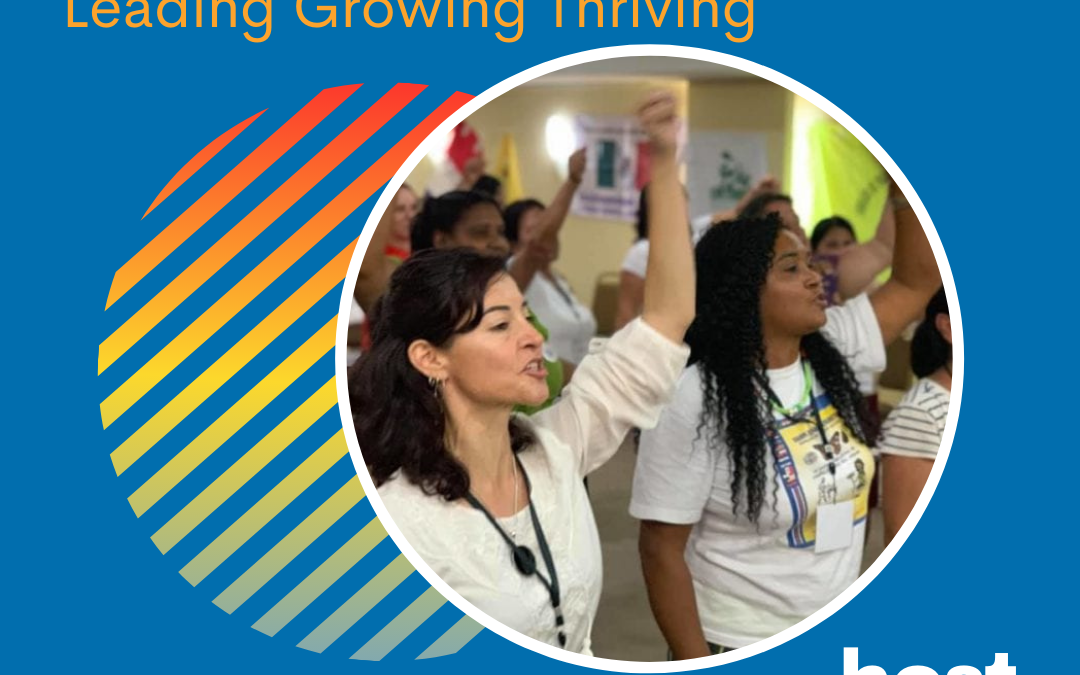
Apr 14, 2021
Domestic workers are among the most invisible workers in the world—yet in Latin America, they are joining together to champion their rights at their workplace and in their communities, says Adriana Paz Ramirez on this week’s episode of The Solidarity Center Podcast.
Paz, Latin American regional coordinator for the International Domestic Workers Federation (IDWF), says these mostly Black and Indigenous women are breaking decades of intergenerational oppression and trauma, and forging new paths through holistic leadership training, creating community-wide social movements and expanding their strength by connecting with each other.
Within six months of a recent leadership training, for example, 9,000 new members signed up with 26 organizations, Paz tells host Shawna Bader-Blau, Solidarity Center executive director.
“I was so touched by a domestic worker leader who said that I have not been able to give my daughter an inheritance, like money or a house, but I’m giving her this movement. Because this is changing our lives, because this is changing our countries, because this is changing history,” she says.
“That is the significance of getting themselves into a union. If the women at the bottom of the bottom are racing up, all of us are raising up.”
Listen Anytime to The Solidarity Center Podcast
The Solidarity Center Podcast, “Billions of Us, One Just Future,” highlights conversations with workers (and other smart people) worldwide shaping the workplace for the better.
Be sure to catch last week’s episode in which Bader-Blau talks with Francia Blanco, a trans rights activist, domestic worker and union leader in Nicaragua who is working with her union to achieve rights, respect and dignity on the job for all LGBTQ+ workers.
Look for final episode this season on April 21, with International Trade Union Confederation President Ayuba Wabba. He explores the Nigerian labor movement’s response to the COVID-19 crisis and discusses the global labor movement’s plans to build back better for workers around the world
And check out recent episodes:
• LGBTQ+ Domestic Workers Win Rights with Their Union
• Making the Gig Economy Work for Workers
• Winning Rights for Migrant Workers
• Defending Democracy: Workers on the Frontline
• Ending Gender-Based Violence at Work: The Campaign to Ratify ILO C190
This podcast was made possible by the generous support of the American people through the U.S. Agency for International Development (USAID) under Cooperative Agreement No.AID-OAA-L-16-00001 and the opinions expressed herein are those of the participant(s) and do not necessarily reflect the views of USAID/USG.











